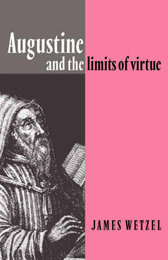
|
Augustine and the Limits of Virtue
Hardback
Main Details
| Title |
Augustine and the Limits of Virtue
|
| Authors and Contributors |
By (author) James Wetzel
|
| Physical Properties |
| Format:Hardback | | Pages:264 | | Dimensions(mm): Height 224,Width 145 |
|
| Category/Genre | Western philosophy - Ancient to c 500
Christian theology |
|---|
| ISBN/Barcode |
9780521405416
|
| Classifications | Dewey:186.4 |
|---|
| Audience | | Professional & Vocational | |
|---|
|
Publishing Details |
| Publisher |
Cambridge University Press
|
| Imprint |
Cambridge University Press
|
| Publication Date |
18 June 1992 |
| Publication Country |
United Kingdom
|
Description
Augustine's moral psychology was one of the richest in late antiquity, and in this book James Wetzel evaluates its development, indicating that the insights offered by Augustine on free-will have been prevented from receiving full appreciation as the result of an anachronistic distinction between theology and philosophy. He shows that it has been commonplace to divide Augustine's thought into earlier and later phases, the former being more philosophically informed than the latter. Wetzel's contention is that this division is less pronounced than it has been made out to be. The author shows that, while Augustine clearly acknowledges his differences with philosophy, he never loses his fascination with the Stoic concepts of happiness and virtue, and of the possibility of their attainment by human beings. This fascination is seen by Wetzel to extend to Augustine's writings on grace, where freedom and happiness are viewed as a recovery of virtue. The notorious dismissal of pagan virtue in 'The City of God' is part of Augustine's family quarrel with philosophers, not a rejection of philosophy per se. Augustine the theologian is thus seen to be a Platonist philosopher with a keen sense of the psychology of moral struggle.
|